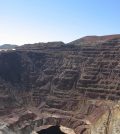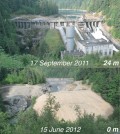Posts for tag "sediment"
Data-Driven Decisions: Tracking Sediment during the Klamath Dam Removal
The largest dam removal in U.S. history, the deconstruction of the Klamath Dam is slated to begin this summer. The project includes four dams along the Klamath River with the first and smallest dam, Copco #2, scheduled...
- Posted September 25, 2023
Covid clears the waters around Key West
Water quality around Key West improved in 2020. The Covid-19 shutdown may be responsible.
- Posted June 15, 2021
A Nationwide View shows “Evolution” of Water Quality Concerns
A nationwide look at 15 water quality constituents, by the U S Geological Survey, reveals evolving concerns in American rivers.
- Posted July 2, 2020
Oil Biodegradation Slower in Darker, Colder Waters
Research into the speed of oil biodegradation under deep water conditions shows that darker, deeper waters slow oil degradation and microbial activity.
- Posted October 10, 2018
Low Clarity Levels, But No Lack of Progress, for Lake Tahoe
Low clarity levels from 2017 caused by record drought and then record rains and high temperatures don’t negate progress on clarity overall.
- Posted September 10, 2018
Mining Waste Cleanup Reveals Interesting Lake Dynamics
As scientists monitor a mining waste cleanup in a deep lake with unusual water dynamics, they learn more about how these dynamics impact remediation efforts.
- Posted June 22, 2018
Atlantic Ocean Overturning Circulation Weakening with Warming
Researchers reveal that the Atlantic Meridional Overturning Circulation (AMOC) is weaker than it’s been in 1,600 years—and why.
- Posted June 7, 2018
Sediment and Tree Rings Reveal Details of 500 Years of Floods—and Human Interference
Researchers have used sediment and tree ring analysis to connect human interference and flood risk in the Mississippi River Delta.
- Posted May 25, 2018
Sediment Cores Reveal Secrets Of Lake Malawi Cichlid Diversity
Scientists at Brown University use sediment cores not only to gauge past climate but also to see how shifts affected the biodiversity of cichlid fish.
- Posted November 1, 2016
Phosphorus In Lake Erie Sediments Small Algal Bloom Factor
An effort led by a consortium of Lake Erie researchers answers long-standing questions to the issue of phosphorus in Lake Erie sediments and its effect on algal blooms.
- Posted July 14, 2016
Cameras Capture Slow Sediment Shifts After Millie Turner Dam Removal
Researchers at Keene State College are investigating the effects of dam removal on downstream sediment deposition, according to a release. Their work is taking place on the Nissitissit River in Massachusetts where the Millie Turner Dam was...
- Posted July 14, 2016
Largest dam removal in U.S. history: restored habitat, sediment release
Five new papers from the USGS and others reveal the effects of the largest dam removal in U.S. history, including a 10 million cubic meter sediment release
- Posted February 25, 2015
Experimental method to measure seafloor oxygen exchange tested in North Sea
Trying out experimental new techniques and technology, European researchers measured oxygen exchange rates at the sandy bottom of the North Sea.
- Posted November 17, 2014
Study: Low oxygen levels slowed evolution
A new study suggests that evolution was slowed due to low oxygen levels more than a billion years ago, according to a BBC news report. The idea has been around for years, and the researchers put it...
- Posted November 17, 2014
















